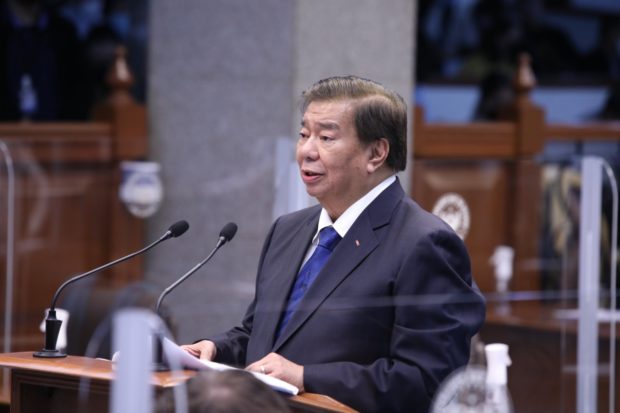Drilon: Put funds on programs solving malnutrition in PH, not on CIF

FILE PHOTO: Former Senate President Franklin M. Drilon, who gained a moniker as “The Big Man of the Senate,” in this file photo taken when bidding farewell to colleagues in his valedictory speech on June 1, 2022. SENATE PRIB PHOTOS / Screen grab
MANILA, Philippines — Channel funds toward combating malnutrition and not to Confidential and Intelligence Funds (CIF), former Senate President Franklin Drilon has urged the government.
During a feeding program in Iloilo City, the former Senate president expressed concern about the millions of Filipino children suffering from malnutrition and questioned the allocation of the 2024 national budget toward addressing the problem.
“This issue must be prioritized, especially when we consider the allocation of funds in the 2024 national budget, where over P10 billion is allocated to Confidential and Intelligence Funds (CIF). We need to ask ourselves how much is devoted to malnutrition,” Drilon said on Tuesday.
On Monday, the bicameral conference committee approved the final version of the P5.768-trillion national spending program for 2024 – leaving the P9.8 billion in CIF for the Office of the President untouched.
READ: Bicam OKs P5.77-trillion budget for 2024; no secret funds for OVP, DepEd
“This is really a problem for the country. Can you imagine that 3.245 million Filipino kids are malnourished? To me, this should be prioritized, not the confidential and intelligence funds,” he stressed.
Citing data from the Department of Health, the former senator noted that at present, the Philippines is grappling with a “pressing health and socio-economic problem.”
Moreover, Drilon pointed out that Filipino learners’ poor showing at the 2022 Programme for International Student Assessment (Pisa) is linked to the problem of malnutrition.
READ: PISA shows PH students ‘5 to 6 years’ behind
“The Pisa survey underscores the correlation between malnutrition and education, showing that stunting adversely impacts the capacity of our children to learn,” he added.
Based on 2022 Pisa’s results, Filipino students aged 15 years old were lagging behind by about five to six years in mathematics, science, and reading compared to students of the same age in most other countries that participated.
“This deeply worrying statistic not only poses immediate threats to the health of our children but also jeopardizes their educational prospects and overall future potential,” Drilon continued.
Data from the United Nations International Children’s Emergency Fund shows that 27 out of 1,000 Filipino children do not make it past their fifth birthday due to malnutrition.